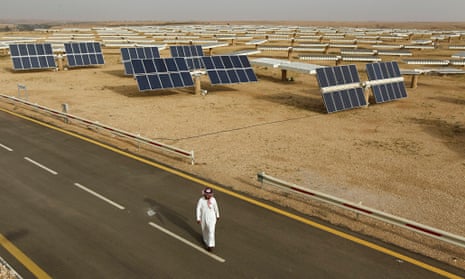If the 19th-century epitome of a futile economic transaction was carrying coals to Newcastle, then the 20th century equivalent might have been importing oil to Saudi Arabia. Rarely has a country been so spectacularly well endowed with a resource so fundamental to the functioning of the global economy in a particular era. How striking, therefore, to learn that the Saudi oil minister, Ali al-Naimi, is predicting that within just 25 years we could no longer need fossil fuels. This, from a representative of a country that has done more than most to block progress in climate negotiations.
Of course, this announcement has little, if anything, to do with a newly discovered yearning to save the planet from climate change; it has everything to do with economics. Saudi Arabia finds itself in the fortunate position whereby it can effortlessly switch from dominating the energy market of the 20th century through oil to dominating the 21st century with renewables. Al-Naimi believes that solar power will benefit the economy even more than fossil fuels. The evidence for this is that global investment in renewables jumped 16% in 2014, with solar attracting over half the total funding for the first time, driven by a 80% decline in manufacturing costs for solar in the last six years.
In many countries, oil has led to a crony capitalist culture serving only a powerful elite, crushing the human rights of the majority and devastating local environments. Saudi Arabia’s oil resources have led to global power and influence through its skilful alliance with the US and the creation of Opec. For Nigeria, booming oil resources have instead become a “resource curse” with worse development outcomes than countries with fewer such natural resources.
When a political elite becomes so dependent on one crucial industry, it is allowed to exercise excessive power, dominate policy space and suck energy out of other economic sectors. Some commentators have suggested that economies heavily dependent on the finance industry suffer similarly, from what might aptly be described as a finance curse.
During a panel session I contributed to in Frankfurt this week, focusing on regulation and consumer protection, I was asked why politicians had failed to regulate financial products and markets adequately. I had to admit that the power of finance has repeatedly left customers exposed to this finance curse.
South-west England may have little in common with the deserts of the Middle East, yet we are also well endowed with the energy resources of the future. The sun may shine less brightly but it offers huge potential for electricity generation. Just this week it was announced that the total area covered by solar farms in Devon, Cornwall, Dorset and Somerset has increased by about 1,000% in the past five years. Such farms are contentious of course, but a recent report I commissioned concluded that the region is awash with renewable energy potential, from offshore wind, tidal power and wave power to ground source heat and geothermal – a mix that could generate 103% of the energy needs of the south-west. These resources have the potential to create 122,000 jobs across the region and add more than £4bn a year to the south-west’s economy.
Far from being a curse that concentrates power in the hands of an elite, renewables work most effectively when in community ownership. Energiewende (energy transformation) in Germany has shown this to be the case. Here, local ownership of renewables has provided a dramatic economic payback to investing communities.
The end game of climate change was always going to be a tussle between the vested interests of the past, using the wealth and power of the fossil fuel era to defend their assets, and the visionary supporters of the new clean energy technologies. The powerhouse states of the fossil era look set to overtake us on the path to a renewable energy future, while we continue to live under a finance curse inflicted on us by a government deeply attached to the finance industry. Saudi Arabia’s motivation may not be protecting the planet from climate change, or indeed improving community control over energy production, but it might just become a useful ally in the transformation towards a new energy era.
